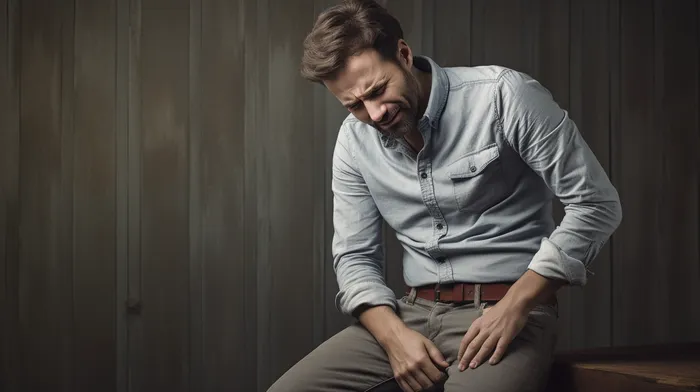Chronic prostatitis and chronic pelvic pain syndrome (CPPS) are conditions that can affect men of any age and cause pelvic pain to persist or come and go for at least three months. This pain may even lead to other issues, such as discomfort during intercourse, urinary problems, or even a sensation like you’re sitting on a golf ball. But, shockingly, the root of this pain could be all in your head.
It is important to note that having your pain originate from your head doesn’t mean it isn’t real. Experts have found that CPPS pain can arise from various factors in the body which don’t originate in the prostate. Most significantly, a man’s psychological health can contribute to this pain, as the mind-body connection is extremely powerful.
The Connection Between Stress and Pelvic Pain
Stress, anxiety, depression, and other psychological issues are closely related to prostatitis. But how can your emotions and stress affect your pelvic health? The answer lies in the fact that stress and anxiety can impact your health in several ways.
Firstly, let’s consider our muscles. Some men tend to carry stress in their neck, back, or shoulders, resulting in chronic headaches or neck pain over time. Other men unconsciously tense their pelvic muscles when stressed, which causes inflammation over time. This inflammation can lead to weaknesses or chronic tension and trigger points in the pelvic floor muscles, ultimately causing pelvic pain and other issues in this area.
Secondly, stress can affect our health on a hormonal level. Stress, anxiety, and emotional problems can elevate a person’s prolactin levels. This hormonal imbalance can damage the immune system and potentially cause inflammation and pain.
Several studies have found that men with high levels of stress and minimal emotional and social support are more likely to have a history of prostatitis. What’s worse is that the more stressed you are, the more likely you are to feel pain. This creates a vicious cycle that can exacerbate your chronic condition.
Addressing Stress and Anxiety
If you suspect that your pelvic pain is related to a pelvic floor disorder, there are many alternative prostatitis treatments available. The most effective way to manage stress-induced pelvic pain is through stress management techniques. These approaches can help you identify the source of your pain and treat more than just the symptoms, which is critical for long-term management.
There are numerous ways to relieve stress, but it’s essential to find what works best for you. Exercise can be an effective stress-reliever for some men, whether it’s going for a run, lifting weights, or practicing calming exercises like yoga. Meditation and breathing exercises are also worth trying, especially for those who are prone to anxiety.
Many preventative programs for pelvic pain combine both physical and psychological elements. For example, the NPAT treatment program takes a whole-body approach to prostatitis and looks at pelvic pain as a whole-body issue. This holistic method involves natural treatments like diet, phytotherapy, alternative treatments, and total body approaches such as stress management, exercise, and lifestyle.
Similarly, the XY Health Program by Isa Herrera is a whole-body approach that incorporates exercises, stretches, pain-relief methods, and addresses the mind-body connection. This physiotherapy is designed for pelvic floor dysfunction and teaches patients to achieve relief from their pelvic pain using their muscles and mind.
Other prostatitis treatment programs, such as the Wise-Anderson treatment, incorporate methods for treating the pelvic muscles along with psychological therapy to address the behaviors that cause tension in the first place.
It’s important to remember that treating male pelvic pain requires time and patience. Quick fixes like antibiotics aren’t effective because CPPS isn’t bacterial, and taking unnecessary antibiotics can even harm your health. Instead, seek natural, drug-free therapies that address the potential cause(s) of your issues. The best part about these natural and alternative therapies for stress and pelvic pain is that they don’t have negative side effects, and many of them can be done in the comfort of your own home. Plus, they provide benefits for your whole-body health, ensuring a well-rounded treatment approach for lasting relief.



